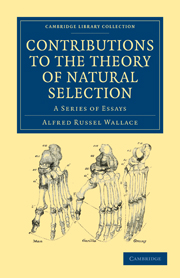Book contents
- Frontmatter
- Preface
- Preface to the Second Edition
- Contents
- I On the Law which has regulated the introduction of New Species
- II On the Tendency of Varieties to depart indefinitely from the Original Type
- III Mimicry, and other Protective Resemblances among Animals
- IV The Malayan Papilionidœ, or Swallow-tailed Butterflies, as illustrative of the Theory of Natural Selection
- V On Instinct in Man and Animals
- VI The Philosophy of Birds' Nests
- VII A Theory of Birds' Nests; showing the relation of certain differences of colour in female birds to their mode of nidification
- VIII Creation by Law
- IX The Development of Human Races under the Law of Natural Selection
- X The Limits of Natural Selection as applied to Man
- NOTES
- INDEX
II - On the Tendency of Varieties to depart indefinitely from the Original Type
Published online by Cambridge University Press: 29 August 2010
- Frontmatter
- Preface
- Preface to the Second Edition
- Contents
- I On the Law which has regulated the introduction of New Species
- II On the Tendency of Varieties to depart indefinitely from the Original Type
- III Mimicry, and other Protective Resemblances among Animals
- IV The Malayan Papilionidœ, or Swallow-tailed Butterflies, as illustrative of the Theory of Natural Selection
- V On Instinct in Man and Animals
- VI The Philosophy of Birds' Nests
- VII A Theory of Birds' Nests; showing the relation of certain differences of colour in female birds to their mode of nidification
- VIII Creation by Law
- IX The Development of Human Races under the Law of Natural Selection
- X The Limits of Natural Selection as applied to Man
- NOTES
- INDEX
Summary
Instability of Varieties supposed to prove the permanent distinctness of Species.
One of the strongest arguments which have been adduced to prove the original and permanent distinctness of species is, that varieties produced in a state of domesticity are more or less unstable, and often have n tendency, if left to themselves, to return to the normal form of the parent species; and this instability is considered to be a distinctive peculiarity of all varieties, even of those occurring among wild animals in a state of nature, and to constitute a provision for preserving unchanged the originally created distinct species.
In the absence or scarcity of facts and observations as to varieties occurring among wild animals, this argument has had great weight with naturalists, and has led to a very general and somewhat prejudiced belief in the stability of species. Equally general, however, is the belief in what are called “permanent or true varieties,”–races of animals which continually propagate their like, but which differ so slightly (although constantly) from some other race, that the one is considered to be a variety of the other. Which is the variety and which the original species, there is generally no means of determining, except in those rare cases in which the one race has been known to produce an offspring unlike itself and resembling the other.
- Type
- Chapter
- Information
- Contributions to the Theory of Natural SelectionA Series of Essays, pp. 26 - 44Publisher: Cambridge University PressPrint publication year: 2009First published in: 1870



